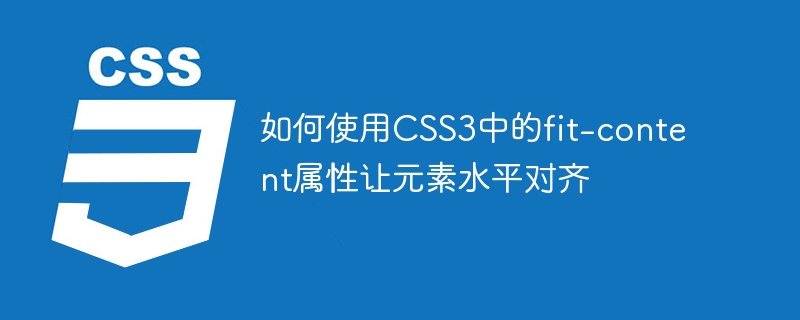Home >Web Front-end >CSS Tutorial >How to align elements horizontally using the fit-content property in CSS3
How to align elements horizontally using the fit-content property in CSS3
- WBOYWBOYWBOYWBOYWBOYWBOYWBOYWBOYWBOYWBOYWBOYWBOYWBOriginal
- 2023-09-09 08:01:071248browse

How to use the fit-content attribute in CSS3 to align elements horizontally
Introduction:
The fit-content attribute in CSS3 is a very practical attribute. It allows the element to automatically adjust its width according to the width of its internal content, thereby achieving a horizontal alignment effect. This article will introduce how to use the fit-content attribute and illustrate it with code examples.
1. What is the fit-content attribute
The fit-content attribute is a new attribute in CSS3, which is used to define the width or height of the element. When an element's width or height is set to fit-content, the element's width or height will automatically adjust based on the width or height of its inner content.
2. How to use the fit-content attribute to achieve horizontal alignment
The following is a common method to use the fit-content attribute to achieve horizontal alignment:
Method 1: Use the display attribute and margin attribute
Horizontal alignment can be achieved by setting the display attribute of the element to inline-block and then using margin:auto. The code example is as follows:
.container {
display: inline-block;
width: fit-content;
margin: 0 auto;
}Method 2: Using flexbox layout
Using flexbox layout can also achieve horizontal alignment. First set the display attribute of the parent element to flex, and then use the justify-content attribute to align the child elements horizontally within the parent element. The code examples are as follows:
.container {
display: flex;
justify-content: center;
}3. Examples of using the fit-content attribute to achieve horizontal alignment
The following are two examples of using the fit-content attribute to achieve horizontal alignment:
Example 1: Using the display attribute and margin attribute
HTML code is as follows:
<div class="container"> <p>这是一段文本</p> </div>
CSS code is as follows:
.container {
display: inline-block;
width: fit-content;
margin: 0 auto;
}Example 2: Using flexbox layout
HTML code is as follows:
<div class="container"> <div class="box">Box 1</div> <div class="box">Box 2</div> <div class="box">Box 3</div> </div>
CSS code is as follows:
.container {
display: flex;
justify-content: center;
}
.box {
width: fit-content;
margin: 10px;
padding: 20px;
border: 1px solid black;
}In these two examples, the width of the element is automatically adjusted according to the width of the internal content, thereby achieving a horizontal alignment effect.
Conclusion:
Horizontal alignment of elements can be easily achieved using the fit-content property in CSS3. By setting the display attribute of the element to inline-block or using flexbox layout, combined with the margin attribute, etc., the element can automatically adjust its width according to the width of its internal content. This gives us more flexibility and effects in web design and layout. To learn and use this attribute flexibly requires a lot of practice and practice.
I hope this article will help you understand and use the fit-content attribute in CSS3, and I wish you better results in design and development!
The above is the detailed content of How to align elements horizontally using the fit-content property in CSS3. For more information, please follow other related articles on the PHP Chinese website!
Related articles
See more- How to center CSS absolute positioning? Four implementation methods of css absolute positioning and centering
- How to set gradient color in css
- How to make text bold in css
- How to prevent text from wrapping in css
- Front-end technology sharing: Use fit-content to achieve horizontal alignment of page elements

